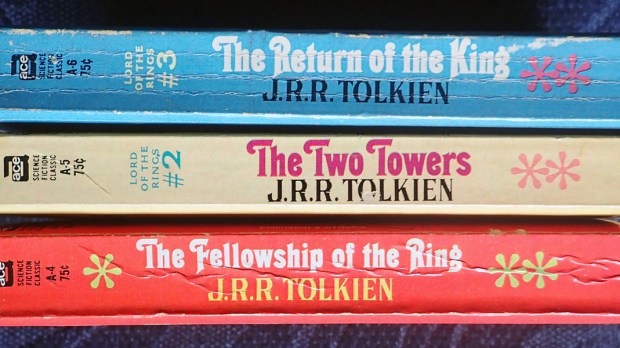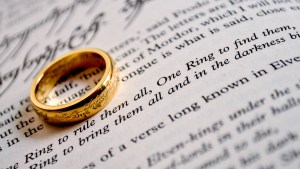When Christopher and Michael Tolkien were young, their father would tell them tales of dwarves, elves, and hobbits. But the stories weren’t read from a book — they came from J.R.R. Tolkien’s imagination. In an interview in The Sunday Telegraph in 1973, Michael described the stories that his father would tell at bedtime. “They were infinitely more exciting and much funnier” than any other stories they heard before.
But only Tolkien’s children were able to enter into the world of Middle Earth. It wasn’t until Christopher, who was very concerned with consistency in his bedtime tales, critiqued his father’s bad memory about details of the story that his father took a pen to paper and began recording the well-loved saga of The Lord of the Rings that we know today.
In the introduction to the 50th anniversary printing of The Hobbit, Christopher wrote: “He also remembered that I (then between four and five years old) was greatly concerned with petty consistency as the story unfolded, and that on one occasion I interrupted: ‘Last time, you said Bilbo’s front door was blue, and you said Thorin had a gold tassel on his hood, but you’ve just said that Bilbo’s front door was green, and the tassel on Thorin’s hood was silver’; at which point my father muttered ‘Damn the boy,’ and then ‘strode across the room’ to his desk to make a note.”
It is often rumored that Tolkien wrote The Lord of the Rings for his children: Christopher, Priscilla, John Francis, and Michael. But in an interview with the New York Times in 1967, Tolkien explained that while his children inspired the story, the story was written for much more than just the amusement of his children at bedtime.
“That’s all sob stuff,” he told Phillip Norman. “Anything that in any way marked out The Hobbit as for children instead of just for people, they [the Tolkien children] disliked — instinctively. I did too, now that I think about it.”
Instead of creating a story just for children, Tolkien had a deep respect for his own children and children in general. He even let his son, Christopher, help construct the story while growing up. Further in the New York Times interview, Tolkien said, “Children aren’t a class. They are merely human beings at different stages of maturity. All of them have a human intelligence which even at its lowest is a pretty wonderful thing, and the entire world in front of them. It remains to be seen if they rise above that.”
Tolkien’s children first heard tales of Bilbo Baggins and his adventures in the shire in the late 1920s, but it wasn’t until 1930 that Tolkien wrote the official first words of The Hobbit on a page of one of his student’s test papers. At the beginning of the writing process, Tolkien typed up his stories. As his sons Michael and Christopher grew up, they also helped him type up the stories. They even helped in the editing process. Striving for absolute perfection, Tolkien paid his son, Christopher, two pennies for every mistake he found when reading through the thick manuscript.
After eight years of work and imagination, Tolkien finished The Hobbit and dedicated it to his children and their inspiration for the mythical tale. After finishing sections, he would read them to his children as bedtime stories. But as his children got older and didn’t call for the stories regularly, Tolkien worked on the manuscript less and less. It wasn’t until his friend, C.S. Lewis, urged him to publish his work that he finally sent it off publisher Sir Stanley Unwin.
“The unpayable debt that I owe to [Lewis] was not ‘influence’ as it is ordinarily understood but sheer encouragement,” Tolkien wrote in a letter in 1965. “He was for long my only audience. Only from him did I ever get the idea that my ‘stuff’ could be more than a private hobby. But for his interest and unceasing eagerness for more I should never have brought The Lord of the Rings to a conclusion.”
Unwin showed the story to his son, Rayner, who read it and loved the story. The Hobbit was published in 1937, and by the end of the year, the first printing copies were completely sold out.
Tolkien’s relationship with his children and their shared love for Middle Earth continued through the years. Towards the end of his life, Tolkien asked his son, Christopher, to finish The Simarillion. Christopher had studied languages at Oxford and knew the world and language of Middle Earth better than anyone else. A skilled writer and editor, Christopher follows in the footsteps of his father. He fulfilled his father’s wishes and has finalized The Silmarillion, as well as many of his father’s early works, including Unfinished Tales, The History of Middle Earth and The Children of Húrin.



